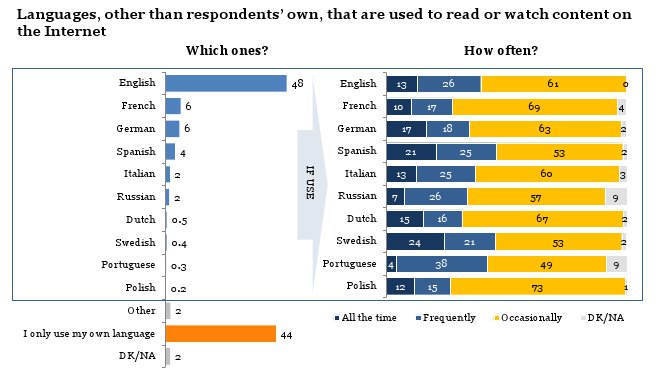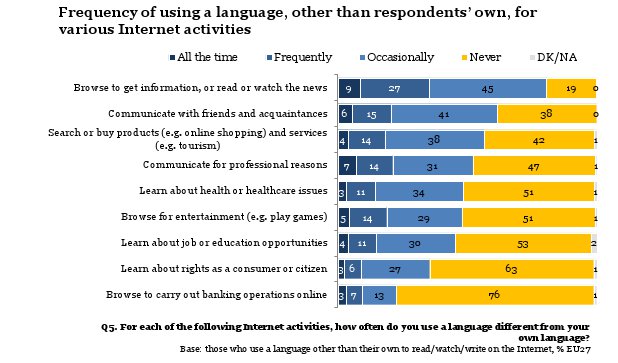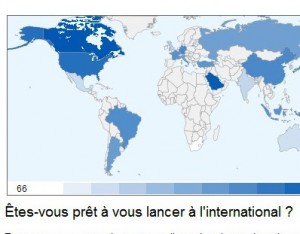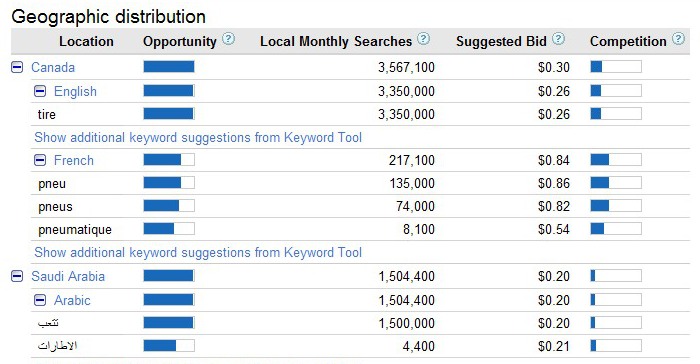Only 18% would buy products online in a foreign language
The Eurobarometer enquiry “User language preferences online” was recently carried out to evaluate Internet users’ opinions and attitudes towards the use of different languages on the Internet.

The survey examined languages other than the user’s own, that are used on the Internet when reading or watching content , and when writing on the Internet. It also examined opinions about the availability of websites in several languages.
While 90% of Internet users in the European Union prefer to access websites in their own language, a slim majority (55%) at least occasionally uses a language other than their own when online . However, more than 4 in 10 (44%) of Internet users in Europe feel they are missing interesting information because web pages are not in a language that they use and only 18% buy products online in a foreign language. Buying online is an area where people prefer to use their own language. 42% of respondent said they never buy online in a language other than their own. Men (61%) are also using foreign languages more than women (51%) to buy online.The results underline the need for investment in online translation tools and localization so that Internet surfers will be able to buy online or find interesting information despite poor language skills.
The survey shows that internet users were considerably less likely to say that they used another language when writing emails, sending messages or posting comments on the web: 35% said they did and 59% said they did not.
While there is a huge amount of quality online content available, not everyone can use it to equal advantage, due to varying language skills. On average 50 % of Internet users in the EU uses a language other than their own to read online, and this proportion ranged from 15% in the UK to 90%-93% in Greece, Slovenia, Luxembourg, Malta and Cyprus, or 25% in Italy would do so.
English as the most frequently used language on the web
English is the most commonly used language when it comes to using the Internet in a different language than one’s own, and it is used by half of Internet users in the EU while Spanish, German and French would only be used by 4% to 6% of users. Again this proportion varies significantly from one European Member to the other: the proportion of Internet users who said that they at least occasionally read or watched online content in English ranged from 35% in the Czech Republic and Italy to 90%-91% in Cyprus and Malta. Respondents in Germany, France, Poland and Austria were the least likely to use English frequently or all the time for reading or watching content on the Web (between 29% and 32%).
Foreign language usage
Most people are faced with a situation of using another language when they browsing to get information (81%), but 62% use it also in social relationships, typically when communicating with friends, or (52%) said the same about communicating for professional reasons. As concerns “searching or buying products (e.g. online shopping) and services (e.g. tourism)”, the proportion was 56%, whereas 36 % use the internet for learning about their rights as consumers or citizens.
A lots of respondents feel that they missed interesting information because web pages are not translated or localized in a language that they understand: this is the case for 60% of Greeks, 58% of Spaniards and 56% of Portuguese.
Opinions about the availability of websites in several languages
Although 9 in 10 Internet users said that, when they had a choice of languages, they always visited a website in their own language , and only a slim majority would accept using an English version of a website if it was not available in their own language (32% strongly agreed and 21% rather agreed). A larger variation was seen in the total level of agreement for the statement that all websites produced in respondents’ countries should have versions available in other languages, ranging from 50% in Finland to 95% in Greece.
This survey sheds light on the preferences of internet users in European, and it clearly shows preferences for multilingual and localized websites. It will be very difficult to implement a pan european ecommerce efficient strategy without translating ans localizing content. We also bear in mind that to reach a good positioning in search engines at a European level, and to be found by your target customers, translating your website is a key factor.
.








